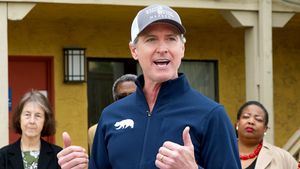Treatment GuideJust DiagnosedSex & DatingAfrican AmericanStigmaAsk the HIV DocPrEP En EspañolNewsVoicesPrint IssueVideoOut 100
CONTACTCAREER OPPORTUNITIESADVERTISE WITH USPRIVACY POLICYPRIVACY PREFERENCESTERMS OF USELEGAL NOTICE
© 2025 Pride Publishing Inc.
All Rights reserved
All Rights reserved
Scroll To Top
By continuing to use our site, you agree to our Privacy Policy and Terms of Use.
The Bush administration has proposed sweeping changes in the way federal Ryan White Act funds are distributed throughout the United States, with areas seeing rising HIV infection rates getting funding priority while cities with long-established AIDS epidemics face funding cuts. Congress is expected to address the changes when it focuses on reauthorization legislation late this year and into 2006. The proposal would eliminate the current funding formula that relies on the cumulative number of AIDS cases in a region to determine which areas get the most federal funds. Instead, more weight would be given to parts of the country with rising infection rates and severe shortages in HIV services, including poor and rural areas, particularly in the South. AIDS treatment advocates say the proposal would cut grants to 51 large urban areas, with San Francisco, for example, slated to lose an estimated $9 million over the next five years. Other major cities with large HIV-positive populations, including New York, Chicago, and Los Angeles, also would see large cuts. The Administration also recommends that a minimum of 75% of Ryan White dollars be used for medical care, which would reduce funding for such supportive services as case management, housing assistance, legal help, food banks, and transportation programs. Some AIDS treatment advocates--including members of the HIV Medicine Association, AIDS Healthcare Foundation, and AIDS Institute--have welcomed the proposed changes, stating that more AIDS funds must reach regions of the country where HIV care remains underfunded. 'Talking about that you don't want money to be moved to another area, I think, is just the wrong argument,' says Carl Schmid, director of federal affairs for AIDS Institute, of complaints sounded by urban AIDS groups. 'Every time you say that, it means you believe it's OK to have someone somewhere else go without those lifesaving services.' Schmid also says that under the current formulas some large states receive more funds than they can spend, pointing out that this year Pennsylvania returned some of its unused money to the federal treasury. 'That's not right,' he says, 'and shows that the formula needs to be fixed.' But critics of the Bush administration's proposals say treatment and support programs in some parts of the country are lacking because state and local governments have been unwilling to pony up their own money. Shifting more federal funds to those areas essentially rewards communities that have done little to fight the disease--and hurts cities and states that are leaders in HIV services. Lawmakers from the states set to lose money, which typically have large congressional delegations and wield considerable political clout, would never approve reauthorization legislation that cuts services to their constituents, according to Ernest Hopkins, director of federal affairs for the San Francisco AIDS Foundation. 'I don't envision the proposals being enacted in their current form,' he says. 'They are by definition very broad and open to interpretation. And we plan to interpret the hell out of them.' What all advocates agree on is that Congress should allocate significantly larger sums to the Ryan White Act when reauthorizing the measure--guaranteeing that all regions of the country receive adequate funding. But whether that Herculean task can be accomplished by a Congress already struggling to pay for relief programs in the wake of two major hurricanes and grappling with a burgeoning federal deficit remains to be seen. 'We've been working really, really hard to send a message as advocates and people living with HIV that we are not interested in a zero-sum conversation where we are pitted against each other for crumbs on the table,' Hopkins says. 'But we've still got a lot of work ahead of us.'
From our Sponsors
Most Popular
Lexi Love comes out as HIV+ after Trump deletes federal resources
January 23 2025 11:23 AM
Grindr is reminding us why jockstraps are so sexy and iconic
May 02 2025 5:36 PM
BREAKING NEWS: Trump admin moves to end federal HIV prevention programs
March 18 2025 6:10 PM
Trump's orders prompt CDC to erase HIV resources
January 31 2025 5:29 PM
Celebrating Black History Month with our annual African American issue
February 01 2025 3:28 PM
Tyler TerMeer vows to continue to fight for health care for all
January 28 2025 3:00 PM
Discover the power of Wellness in your life
March 26 2025 12:41 PM
Plus: Featured Video
Latest Stories
Dancer. Healer. Survivor. DéShaun Armbrister is all of the above
July 02 2025 8:23 PM
Two right-wing Supreme Court justices signal they may uphold access to PrEP and more
April 21 2025 4:10 PM
Broadway's best raise over $1 million for LGBTQ+ and HIV causes
April 03 2025 7:15 PM
Plus nominated for 2025 GLAAD Media Award
January 22 2025 12:42 PM
'RuPaul's Drag Race' star Trinity K Bonet quietly comes out trans
December 15 2024 6:27 PM
AIDS Memorial Quilt displayed at White House for the first time
December 02 2024 1:21 PM
BREAKING: Supreme Court rules to save free access to preventive care, including PrEP
June 27 2025 10:32 AM
1985: the year the AIDS crisis finally broke through the silence
June 26 2025 11:24 AM
Trump admin guts $258 million in funding for HIV vaccine research
June 03 2025 3:47 PM
500,000 Children at Risk: PEPFAR Funding Crisis
April 08 2025 3:51 PM
The Talk Season 5 premieres this spring with HIV guidance for the newly diagnosed
March 26 2025 1:00 PM
Jess King is here to help you live your happiest, healthiest life yet
March 24 2025 4:35 PM
A camp for HIV-positive kids is for sale. Here's why its founder is celebrating
January 02 2025 12:21 PM
VIDEO: A man living with HIV discusses his journey to fatherhood
June 10 2025 4:58 PM
HRC holds 'die-in' to protest Trump health care cuts
April 28 2025 2:11 PM
Season 4 of The Switch on resilience & radical self-love returns this spring
March 26 2025 12:20 PM
Gerald Garth is keeping people of color happy and healthy through trying times
March 11 2025 3:38 PM
This long-term HIV survivor says testosterone therapy helped save his life.
December 16 2024 8:00 PM
Ricky Martin delivers showstopping performance for 2024 World AIDS Day
December 05 2024 12:08 PM













































































